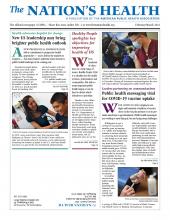Public health advocacy
The Midwestern Public Health Training Center released a four-part podcast series to promote advocacy in December. The series features interviews with regional politicians and offer advice on how to confidently advocate for public health. The series is part of the center’s “Share Public Health” podcast, which is available on podcast networks.
COVID-19 and children
The Sesame Workshop, the educational organization behind “Sesame Street,” launched a new series of animations to educate children on COVID-19 in December. The cartoons tell children about how to protect themselves by using masks and following good hygiene, as well as how to express feelings such as fear and stress. The cartoon is available in English, Spanish, Hindi and Portuguese. For more information, visit https://seseamestreetincommunities.org.
COVID-19 and education
The Harvard T.H. Chan School of Public Health held a forum on “The Coronavirus Pandemic: The Disrupted School Year and Public Health” online in January. The event, available as an on-demand video and transcript, explores how school closures and distance learning are impacting K-12 students and families. To watch the recording, visit https://theforum.sph.harvard.edu .
COVID-19 and refugees
The University of Minnesota launched a new National Resource Center for Refugees, Immigrants and Migrants in November to promote COVID-19 prevention, control and mitigation. Funded by a $5 million grant from the Centers for Disease Control and Prevention and the International Organization for Migration, the resource center will develop and share best practices for local and state health departments to serve immigrant and refugee populations. To access the resource, visit https://nrcrim.umn.edu.
COVID-19 vaccines
In January, the Association of Schools and Programs of Public Health and the National Association of County and City Health Officials released “Engaging Communities to Increase Confidence in COVID-19 Vaccines.” The 75-minute webinar is available for on-demand viewing and explores the local and academic partnerships engage communities and reduce vaccine hesitancy. To watch the recording, visit www.aspph.org.
US health care
Johns Hopkins University Press was slated to publish “Corporatizing American Health Care: How We Lost Our Health Care System,” by Robert Derlet, MD, in February. The book explores decades of health policy and the evolution of medical care in the U.S. Derlet is an emergency medicine physician at the University of California-Davis. For more information, visit https://jhupbooks.press.jhu.edu.
Health disparities
The Centers for Disease Control and Prevention created a new web page on COVID-19 Racial and Ethnic and Health Disparities in December. The page collects and organizes data on the disproportionate racial and ethnic impacts of the COVID-19 pandemic. Visit the page at http://bit.ly/cdccoviddisparities.
Online MPH-PEP
In December, the Ohio State University College of Public Health announced a fully online Master of Public Health Degree Program for Experienced Professionals. The program, which previously featured on-campus components, is open to public health professionals nationwide and focuses on population health leadership and management. For information on the program, visit https://cph.osu.edu.
Racism
The University of Minnesota School of Public Health’s podcast “Health in All Matters,” is focusing on racism and public health in its second season. The audio series uses personal stories and expert commentary to explore issues of racial justice and how public heath can support structural change. The podcast is available on podcast networks.
Online MHA
The University of California-Los Angeles Fielding School of Public Health is now offering an online Master of Health Care Administration degree program, the first of its type in the University of California system. Announced in December, registration is now open for Summer 2021 session and is limited to 40 students per course.
Vaccine hesitancy
MIT Press published “Anti-Vaxxers: How to Challenge a Misinformed Movement,” by Jonathan Berman, PhD, in September. The book examines the history of anti-vaccination misinformation movements and offers strategies for refuting false claims. Berman is a science advocate and assistant professor. For more information, visit https://mitpress.mit.edu.
- Copyright The Nation’s Health, American Public Health Association









